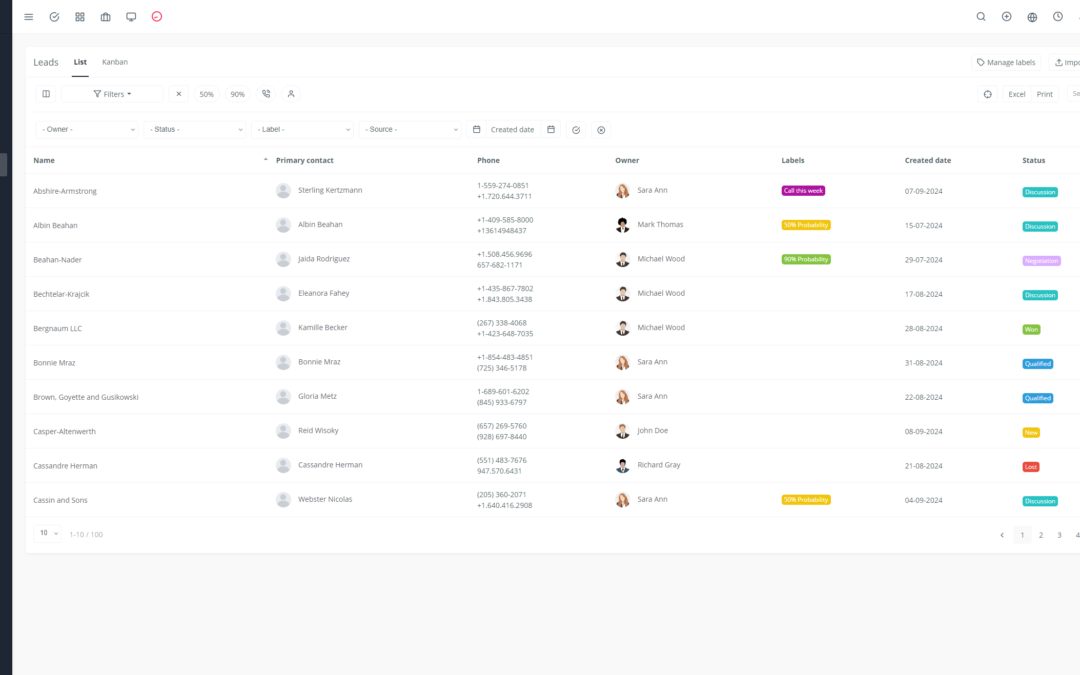In today’s business world, scheduling appointments is a crucial element for any company’s success. A Customer Relationship Management (CRM) system can transform the way you manage your appointments and help you achieve your business goals. 📈
How Does a CRM Improve Appointment Scheduling?
A CRM offers a multitude of features that allow you to manage your appointments more efficiently and maximize their impact.
Here are some of the key ways a CRM can revolutionize your appointment scheduling:
1. Enhance Appointment Quality:
In-depth Customer Understanding: A CRM centralizes all information about your customers, their needs, and their preferences. This allows you to qualify leads and schedule appointments with potential customers who are genuinely interested in your products or services.
Appointment Personalization: A CRM allows you to personalize each appointment based on the information gathered about the customer. You can then offer deals and solutions tailored to their specific needs.
2. Increase Appointment Conversion Rates:
Appointment Tracking: A CRM enables you to track the progress of appointments, identify who participated, and understand the conclusions reached. This allows you to analyze results and identify areas for improvement.
Lead Management: The CRM lets you manage leads, qualify them, and convert them into customers. By automating lead follow-up, you can increase conversion rates and improve the performance of your sales teams.
3. Optimize Appointment Scheduling:
Shared Calendar: A CRM centralizes the calendars of your team, allowing you to schedule appointments and coordinate the schedules of all your team members.
Availability Management: The CRM enables you to easily manage the availability of your teams and find the most suitable time slots for your appointments.
Automatic Reminders: The CRM lets you send automatic reminders for appointments, preventing forgetfulness and cancellations.
4. Automate Appointment Scheduling:
Booking Forms: A CRM can include online booking forms so your customers can schedule appointments easily and at any time.
Integration with External Tools: A CRM can integrate with external scheduling and booking tools for more seamless management.
5. Efficiently Manage Appointment Requests:
Ticketing System: A CRM can manage appointment requests centrally, allowing you to track the status of each request and respond to customers quickly.
6. Organize Appointments Based on Availability:
Scheduling Features: The CRM lets you organize appointments based on the availability of your teams and clients.
Conflict Management: The CRM helps you avoid appointment conflicts and optimize the scheduling of your activities.
7. Personalize Appointments:
Appointment Template Creation: A CRM allows you to create personalized appointment templates based on your needs and offerings.
8. Track Appointments and Results:
Performance Analysis: The CRM lets you track the performance of your sales teams and identify strengths and weaknesses.
Reporting and Dashboards: The CRM provides reports and dashboards to track the progress of your appointments and analyze results.
9. Improve Customer Communication:
Sending Personalized Messages: The CRM allows you to send personalized messages to your customers before, during, and after appointments.
Email and Call Management: The CRM lets you manage emails and calls related to your appointments.
10. Identify Sales Opportunities:
Customer Data Analysis: The CRM allows you to analyze customer data and identify sales opportunities.
Prospecting and Cross-Selling: The CRM lets you offer complementary products or services to your customers.
11. Accelerate the Sales Process:
Automation of Repetitive Tasks: The CRM lets you automate repetitive tasks like sending messages or following up on appointments, saving you time and allowing you to focus on higher-value tasks.
12. Enhance Customer Satisfaction:
Personalized Customer Service: The CRM lets you provide personalized customer service and meet the needs of your customers.
Positive Customer Experience: The CRM helps you create a positive customer experience and build customer loyalty.
13. Reduce Appointment Scheduling Costs:
Task Automation: The CRM automates repetitive tasks, reducing labor and time costs.
Resource Optimization: The CRM enables you to optimize the use of your resources and reduce costs related to appointment management.
14. Obtain Valuable Appointment Data:
Appointment Tracking and Analysis: The CRM allows you to track and analyze appointments to identify trends and areas for improvement.
15. Create Appointment Reports:
Reporting and Data Analysis: The CRM lets you create reports on appointments and analyze data to make informed decisions.
16. Automate Appointment Reminders:
Automatic Reminder Functionality: The CRM lets you automate appointment reminders to prevent forgetfulness and cancellations.
17. Integration with Other Management Tools:
Integration with External Tools: The CRM integrates with other management tools like calendars, messaging platforms, and marketing tools.
18. Improve Sales Team Productivity:
Workflow Optimization: The CRM lets you optimize the workflows of your sales team and enhance productivity.
19. Simplify Appointment Scheduling:
Intuitive User Interface: The CRM has an intuitive user interface that makes scheduling appointments and managing information easy.
20. Strengthen Customer Relationships:
Personalized Communication:* The CRM enables you to communicate with your customers in a personalized manner and strengthen customer relationships.
In conclusion, a CRM is a valuable tool for any business looking to optimize appointment scheduling and improve customer relationship management. The CRM allows you to save time, improve the quality of appointments, increase conversion rates, and build customer loyalty. 🤝

